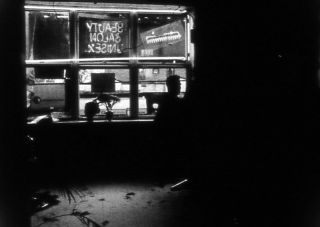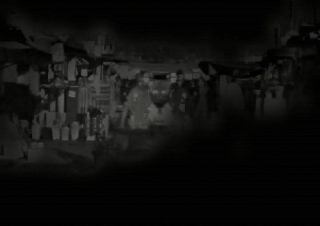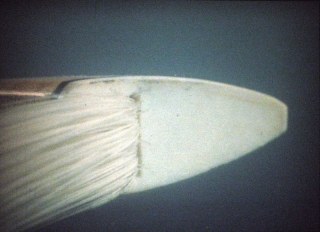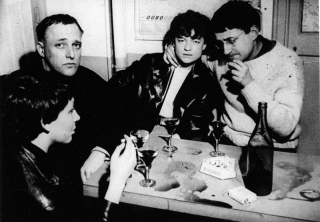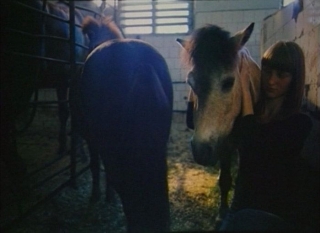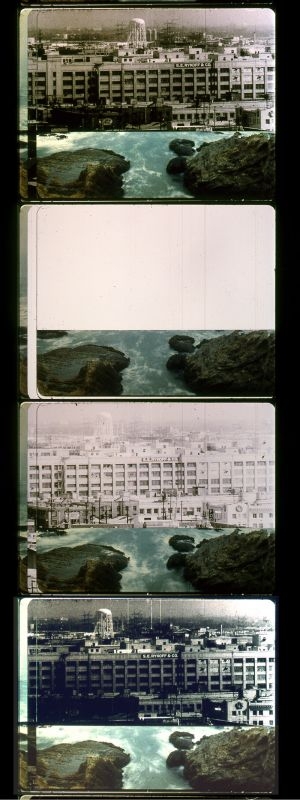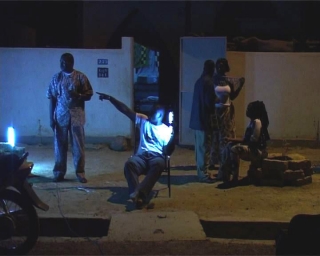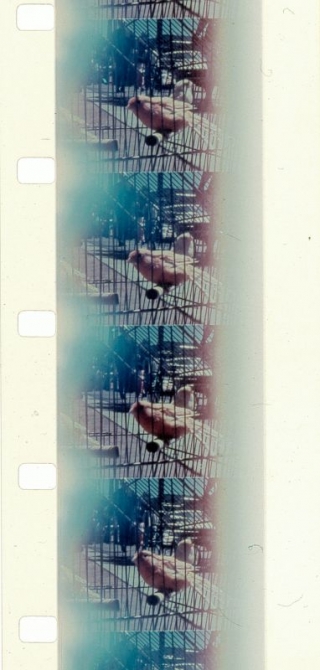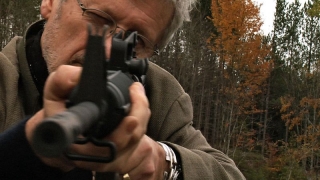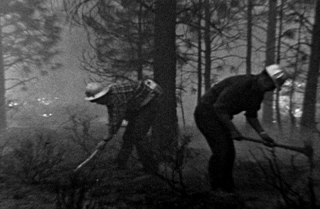Date: 25 October 2008 | Season: London Film Festival 2008 | Tags: London Film Festival
THE TIMES BFI 52nd LONDON FILM FESTIVAL
Saturday 25 – Sunday 26 October 2008
London BFI Southbank
The festival’s annual celebration of artists’ film and video will take place on the weekend of 25-26 October 2008.
Over two days, a diverse selection of international work will be presented at in eight screenings that aim to challenge, entertain and enlighten viewers. Continuous installations by artists Thomas Köner and Neil Beloufa will be presented for one day each in the BFI Southbank Studio.
This year’s programme includes a number of solo screenings in which the work of several filmmakers can be explored in depth. Nathaniel Dorsky returns to London to present his transcendent personal cinema, which has been a regular highlight in recent years. Documentaries on contemporary Russian life by Alina Rudnitskaya are featured, as are newly preserved 35mm prints of two films by the radical French theorist Guy Debord. Michel Auder’s extended fictional biography looks back over a life in the New York art world through footage from his vast archive of videotapes.
New approaches to ethnography and documentary recur throughout the weekend and are explored in the work of British filmmaker Ben Rivers. In the mixed programmes, the presence of both emerging and established filmmakers open a window onto a wide range of creativity. Featured artists include Pat O’Neill, Jayne Parker, Phil Solomon, Lawrence Jordan, Nicky Hamlyn, Alexandra Cuesta, David Gatten, Sylvia Schedelbauer and Bruce Conner.
Elsewhere in the festival, look out for new films by Straub/Huillet and Agnes Varda, Momma’s Man by Azazel Jacobs (starring and shot in the loft of his parents Ken and Flo Jacobs), James Benning’s captivating RR, and preservations of The Exiles, Manhatta and NY, NY.
Date: 25 October 2008 | Season: London Film Festival 2008 | Tags: London Film Festival
PNEUMA MONOXYD
Saturday 25 October 2008, from 12-7pm
London BFI Southbank Studio
Thomas Köner, Pneuma Monoxyd, Germany-Serbia, 2007, 10 min (continuous loop)
Merging surveillance images of a German shopping street and a Balkan marketplace, Köner’s darkly abstract work, with its spatially evocative soundtrack, generates a muted sense of spectral dystopia.
PROGRAMME NOTES
PNEUMA MONOXYD
Saturday 25 October 2008, from12-7pm
London BFI Southbank Studio
PNEUMA MONOXYD
Thomas Köner, Germany-Serbia, 2007, video, colour, sound, 10 min
As surveillance becomes a fundamental of today’s society, Köner’s work focuses on its implications by monitoring observation and usurping its tools. With the intention of taking a step forward from here, the artist began to invent his own imaginary tool. The scenes in Pneuma Monoxyd are observed with such an imaginary tool. Its ability to unlock future, past and present unveils the moment as it is being pieced together, blurred and unstable. Premonition, memory and splinters of ‘here’ and ‘now’ become perceptible as part of the fabric of the observed time. A static gaze of a Balkan market unveils the present moment as a porous frontier and seems like a window looking out to the beyond. (Transmediale 2008)
Thomas Köner attended music college in Dortmund and studied electronic music at the CEM-Studio in Arnhem. Extending his explorations of sound and duration to images, he began to work on video installations, photography and net art. Alchemie (1992) was the first of a sequence of collaborations with film artist Jürgen Reble in which sound and image were integrally manipulated during live performance. Köner has also composed music to accompany historic silent films for the Louvre and the Musée d’Orsay, Paris. He has been awarded the New Media Prize at the Montreal International Festival New Cinema New Media (2000), the Golden Nica at the Prix Ars Electronica (2004) and the Tiger Cub Award, International Film Festival Rotterdam (2005). His installation Suburbs Of The Void received the Transmediale 2005 award in Berlin and was presented at La Biennale di Venezia, Teatro La Fenice, as a live performance that the same year. Köner participated in the Media Art Biennal Seoul in 2008, and is currently working on a suite of five permanent sound installations commissioned by the Musée Rimbaud in Charleville-Mézières. www.koner.de
Back to top
Date: 25 October 2008 | Season: London Film Festival 2008 | Tags: London Film Festival
A SENSE OF PLACE
Saturday 25 October 2008, at 2pm
London BFI Southbank NFT3
Nicky Hamlyn, Four Toronto Films, UK, 2007, 18 min
During a residency in the Canadian city, Hamlyn made this suite of films that explore a direct relationship between subject matter and camera apparatus. Three scrutinise aspects of the urban locale, the other an accelerated view of Koshlong Lake.
Robert Todd, 21 Alleys, USA, 2007, 9 min
A residential street, seen through the passageways that separate its dwellings, is the focus of this understated study of gentrification in a Boston neighbourhood.
Phil Solomon, Last Days in a Lonely Place, USA, 2007, 22 min
Solomon has created a sombre elegy for a departed friend from fragments of movie soundtracks and anomalous images liberated from Grand Theft Auto. A soul drifts through unpopulated (virtual) spaces and we see absence.
Rebecca Baron & Douglas Goodwin, Lossless #2, USA, 2008, 3 min
Witness the dematerialization of an avant-garde standard as incomplete digital files, downloaded from file sharing networks, induce trouble in the image.
Jayne Parker, Trilogy: Kettle’s Yard, UK, 2008, 25 min
Linear Construction, Woman with Arms Crossed and Arc refer back to a quartet of films made with musician Anton Lukoszevieze almost a decade ago. This new anthology for solo cello was shot at Kettles Yard and incorporates items from the museum’s collection which open up metaphorical space and meaning.
Lawrence Jordan, The Miracle of Don Cristobal, USA, 2008, 12 min
An alchemical melodrama composed of engravings from 19th century adventure stories. The illustrations are conjured into motion as improbable sounds collide with a Puccini aria.
PROGRAMME NOTES
A SENSE OF PLACE
Saturday 25 October 2008, at 2pm
London BFI Southbank NFT3
FOUR TORONTO FILMS
Nicky Hamlyn, UK, 2007, 16mm, b/w & colour, silent, 18 min
The suite of four short films explores ideas about framing, centred round the attempt to find a necessary correspondence between the facts of the camera apparatus; fixed, rectangular frame and aspect ratio, and the work’s subject matter. A related idea concerns the figuration within the films of the manner in which the camera creates its own pro-filmic. To this end, there is a more or less recurring theme of frames within frames. Three of the four sections were filmed in, or within a stones throw of, the house in Toronto where I stayed while completing the work as an artist in residence at LIFT workshops (sidewalk, window, back lane). The fourth section was made at Koshlong Lake, near Haliburton, about 100 miles northeast of Toronto. (Nicky Hamlyn)
21 ALLEYS
Robert Todd, USA, 2007, 16mm, colour, soumd, 9 min
Since 1989, Boston-based filmmaker Robert Todd has been quietly developing one of the most distinctive bodies of work in the American film scene. Todd’s beautifully shot films draw together documentary and experimental elements; they don’t hew to a single, clearly defined style, but nevertheless show a consistency of poetic vision, spirit, and purpose. Through suspended moments of reflection and anticipation, Todd’s films explore the difficult-to-define emotions engendered by the stresses of civilization. (Cinemateque Ontario)
LAST DAYS IN A LONELY PLACE
Phil Solomon, USA, 2007, video, b/w, sound, 22 min
Farewell my friends, Farewell my dear ones, If I was rude, Forgive my weakness, Goodbye my friends, Goodbye to evening parties, Remember me, In the spring, To work for your bread, Soon you must leave, Remember your families, And work for your children, I don’t need much, and the older I become, I realize, My friendships, Will carry me over any course of distance, any cause of sorrow, My friends that last, Will dance one more time with me. I don’t need words, This, I need. (Polly Jean Harvey, Before Departure)
LOSSLESS #2
Rebecca Baron & Douglas Goodwin, USA, 2008, video, b/w, sound, 3 min
Access to experimental films has been limited by the scarcity of prints and often by filmmakers’ careful regulation of viewing conditions and formats. Though for years bootleg tapes, DVDs, and even unauthorized prints have circulated, many experimental films are now receiving much higher circulation through high-quality bit torrents available to anyone with an interest who knows how to find them in the world they share with Britney Spears videos, pornography, amateur video diaries, and first-run movies on the Internet. Lossless by Rebecca Baron and Douglas Goodwin, is a series of works that looks at the dematerialization of film into bits, exposing the residual effects of the process that makes file sharing possible. They used several methods to alter these works, either interrupting the data streaming by removing basic information holding together the digital format or comparing 35mm to DVD and examining the difference between each frame. The project considers the impact of the digital age on filmmaking and film watching, the materiality and demateriality of film as an artistic medium, as well as the social aspects of how the online community functions and the audience for such obscure films. (Carpenter Centre for the Visual Arts, Harvard University)
TRILOGY: KETTLE’S YARD
Jayne Parker, UK, 2008, video, b/w & colour, sound, 25 min
Linear Construction, Woman with Arms Crossed, and Arc form Trilogy: Kettle’s Yard, three films sited at Kettle’s Yard, University of Cambridge, and featuring cellist Anton Lukoszevieze. These films are documents of musical performance: respectively ‘Récitation’ (1980) by Georges Aperghis; ‘Sensitivo, per arco solo, n. 7 da 7 Fogli’ (1959) by Sylvano Bussotti; and ‘Raimondas Rumsas’ (2002) by Laurence Crane. They include art objects from the Kettle’s Yard collection, opening up metaphorical space and meaning. Each piece holds a special interest: In ‘Récitation’ the cellist is required to tap the strings with his left hand while speaking phonemes based around the word ‘violoncelle’. Of ‘Sensitivo’ Anton writes, ‘The score of ‘Sensitivo’ is a graphic score for any solo stringed instrument. It was composed to allow a situation where the instrumentalist encounters and creates the graphic score with a combination of improvised gestures and concrete sounds from the notation. In my realization I use the bow to a certain extent as if it were a pen or brush in the hand of an imaginary graphic artist, scanning the contours of drawn and scribbled lines …’ Anton plays sitting in front of Rodin’s bronze of Eve, which Rodin sometimes referred to as ‘Woman with Arms Crossed’. ‘Raimondas Rumsas’ was written specially for Anton to play with his Bach-Bogen, a curved bow capable of playing up to four strings at once. (Jayne Parker)
THE MIRACLE OF DON CRISTOBAL
Lawrence Jordan, USA, 2008, 16mm, colour, sound, 12 min
For a long time I have wanted to construct a melodrama (animated) from the funky engravings of the 19th century which illustrated ‘young peoples’ adventure stories. Eventually, through a great deal of selection, such a film fell into place. I have attempted to present the high emotional overlay of very mundane events in this ‘alchemical melodrama’. To that end, Puccini combines with blatant sounds of police sirens and old door buzzers on the soundtrack, while ‘real’ and nightmare images compete for screen time. (Lawrence Jordan)
Back to top
Date: 25 October 2008 | Season: London Film Festival 2008 | Tags: London Film Festival
GUY DEBORD
Saturday 25 October 2008, at 4pm
London BFI Southbank NFT3
‘The cinema, too, has to be destroyed.’ (Guy Debord)
An extremely rare opportunity to see new 35mm prints of films by French writer and theorist Guy Debord, best known for The Society of the Spectacle. Debord was a central figure of the Situationist International (SI), a nihilistic band of agitators whose harsh critiques of capitalist society, inspired by Marxism and Dada, were conveyed through publications, visual art and collective actions. Articulated primarily in the French language, Situationism was relatively ineffective in Britain and America in its time, and though numerous translations are now available, Debord’s radical films remain unseen. Far ahead of its time, his technique of ‘détournement’ assimilates still and moving image-scraps from features, newsreels, printed matter, advertisements and other detritus to satisfy the viewer’s ‘pathetic need’ for cinematic illusion. Propelled by a spoken, monotonous discourse, the images do not so much illustrate the text as underpin it, often maintaining a metaphorical relationship that may not at first be apparent. The two films showing here effectively bookend Debord’s involvement with the Situationists, whose politically subversive practice aspired to provoke a revolution of everyday life.
Guy Debord, Sur le passage de quelques personnes à travers une assez courte unité de temps, France, 1959, 18 min
In the dingy bars of St-Germain-des-Prés, Debord and his associates formed a bohemian underground for whom ‘oblivion was their ruling passion.’ This anti-documentary captures the SI close to its moment of inception, following their separation from the Lettristes two years prior.
Guy Debord, In girum imus nocte et consumimur igni, France, 1978, 105 min
‘I will make no concessions to the public in this film. I believe there are several good reasons for this decision, and I am going to state them.’ And state them he does. Debord’s final film is a denunciation of cinema and society at large, an unremitting diatribe against consumption. The SI is equated to a military operation (charge of the light brigade, no less) as its members are presented alongside images of the D-Day landings, Andreas Baader, Zorro, a comic strip Prince Valliant and quotes from Shakespeare, Ecclesiastes and Omar Khayyám. Debord takes no prisoners in this testament to his anarchistic vision.
Screening in the presence of Alice Debord.
PROGRAMME NOTES
GUY DEBORD
Saturday 25 October 2008, at 4pm
London BFI Southbank NFT3
SUR LE PASSAGE DE QUELQUES PERSONNES À TRAVERS UNE ASSEZ COURTE UNITÉ DE TEMPS
Guy Debord, France, 1959, 35mm, b/w, sound, 18 min
You have rightly noticed the difference in the text-image relation between the first and second parts of Passage. Detourned phrases can be found throughout the film, but the majority are in the first part. My plan was as follows: The film begins like a typical, technically ordinary documentary. Gradually it becomes less clear and more disappointing, which might at first seem to be the result of a pretentious ‘ideological’ interpretation of an otherwise clear subject, because the text appears increasingly inadequate and pompously inflated in relation to the images (the tone of Lefebvre = Marx-Goldman-Huizinga!). The question then arises: What is the subject of this film? – which I think represents an irritating and upsetting break with the habitual spectacle. With the appearance of the first blank screen, the film begins to contradict itself in every way – and thus becomes more clear as its creator takes sides against it. It is both a rather explicitly anti-art-film about the unaccomplished work of this era and an ultimately realistic description of a way of life deprived of coherence and significance. The form corresponds to the content. It does not describe this or that particular activity (merchant marine, oil exploration, some historic monument to admire – or even to demolish, as in Franju’s magnificent Hôtel des invalides), but the very core of present-day activity in general, which is empty. It is a portrayal of the absence of ‘real life.’ This slow movement of exposure and negation is what I was trying to embody in Passage. But very summarily and arbitrarily, I must admit. Despite the prevalent fixation on the economic obstacles, the main problem is actually that short films are quite unsuitable for truly experimental cinema. Their very brevity tends to encourage a moderate, neatly edited form of expression. But it does seem interesting to détourn the fixed form of the traditional documentary, and this tends to tie us to the inviolable 20-minute limit. (Guy Debord, Letter to André Frankin, 1960)
IN GIRUM IMUS NOCTE ET CONSUMIMUR IGNI
Guy Debord, France, 1978, 35mm, b/w, sound, 105 min
‘I will make no concessions to the public in this film,’ says Guy Debord at the beginning of his 1978 film, and he stays true to his word. The palindromically-titled In girum (roughly translated as ‘we spin around the night consumed by fire’) is not so much a difficult film as an act of pure negation from the founder of the Situationist International. Like all of Debord’s films, In girum stands apart from cinema, not to mention the modern world as it has evolved into its present state. Images from magazines, comics, and popular films are turned inside out (a process defined by Debord as détournement) to illustrate what he sees as the complete vacuity of mediatized society, of which we the viewers are unknowing participants. To those who complain that they do not understand his purpose or his historical allusions, Debord suggests that they ‘blame their own sterility and lack of education rather than my methods; they have wasted their time at college, bargain shopping for worn-out fragments of second-hand knowledge.’ In girum imus nocte et consumimur igni is an act of condemnation, but it is also an affirmation – of our ability to build on the best rather than the worst in mankind, to create a true Utopia rather than a paltry counterfeit. Without exaggeration, this is one of the most provocative experiences you’ll ever have at the movies. (Kent Jones, Film Society of Lincoln Centre)
Back to top
Date: 25 October 2008 | Season: London Film Festival 2008 | Tags: London Film Festival
ALINA RUDNITSKAYA
Saturday 25 October 2008, at 7pm
London BFI Southbank NFT3
Alina Rudnitskaya’s humanistic approach to documentary filmmaking often brings out the humour in her chosen subjects. As an introduction to her work, this programme depicts three diverse groups of contemporary Russian women.
Alina Rudnitskaya, Amazons, Russia, 2003, 20 min
A sensitive portrait of an unusual urban phenomenon: a troupe of independent and strong-minded girls who keep horses in the heart of St Petersburg. Amazons follows a new volunteer as she tries to find her place within the group dynamic.
Alina Rudnitskaya, Besame Mucho, Russia, 2006, 27 min
With music providing an escape from their duties as veterinarians, nurses and cleaners, the amateur chorus of a provincial town rehearse songs from Verdi’s ‘Aida’. Close bonds are formed, but in true diva style, relationships within the choir are frequently inharmonious.
Alina Rudnitskaya, Bitch Academy, Russia, 2008, 29 min
An improbable symbol of modern Russia is displayed in this tragicomic verité on the aspirations of young women. In a progressive twist on assertiveness training, a middle-aged, paunchy Casanova (who surely loves his job) gives classes on how to seduce the male using role play, styling critiques and sexy dancing. The ultimate goal is to hitch a millionaire, and though there’s much humour in the situation, occasional tears and telling looks remind us that the insecurities of real lives are being laid bare.
PROGRAMME NOTES
ALINA RUDNITSKAYA
Saturday 25 October 2008, at 7pm
London BFI Southbank NFT3
AMAZONS
Alina Rudnitskaya, Russia 2003, 35mm, colour, sound, 20 min
A cinematic portrait of a strange urban phenomenon: female equestrians who make a living by riding horses in the city streets and dogmatically oppose the participation of men. The inside story of these urban Amazons is shown through the eyes of a rookie team member. (Shadow Festival, Amsterdam)
BESAME MUCHO
Alina Rudnitskaya, Russia, 2006, video, colour, sound, 27 min
An amateur women’s choir in the provincial Russian town Tikhvin rehearses the opera ‘Aida’. In the daytime these women – heroes of the film – have ordinary life, work in the shops, remove the garbage, load goods on trucks, overcome the illnesses, but in the evenings they are carried away in absolutely different world. Their lives are filled with dreams, expectations of something bigger, brighter, that will help them to fly away from their ordinary life that is hard sometimes. The brief visit of the Italian delegation for which they rehearsed the opera underlines their illusions. The film is full with sadness and humour, which is true to the atmosphere of Russian village life in these times. (St. Petersburg Documentary Film Studio)
BITCH ACADEMY
Alina Rudnitskaya, Russia, 2008, video, colour, sound, 29 min
There were times, when ‘bitch’ had a negative connotation, but today it has become a real brand. ‘Bitch’ has become an example to follow for modern woman, an ideal image of our days. Most women older than 15 try to learn how to be a bitch. Who is a vixen, a modern bitch? How to become successful women? What does it mean to be a woman? What is ‘women’s nature’ and ‘women’s spirit’? Is it possible for a women to achieve, to succeed in this life without crossing ethical borders? A vixen is not a hysterical woman or capricious fool or envious snake. A vixen is a woman that follows her own desires but not someone’s advice, she is independent and relies on herself only, she knows what she wants from life and men, she doesn’t follow common stereotypes, she knows men’s ‘weak’ points, and what is more – she has her inner freedom. The main shooting technique used in this film is a method of observation. Over time, the camera didn’t attract attention to itself, leaving the subjects comfortable and behaving in a natural way. This film pretends to be called ‘the best documentary comedy’ about women. (St. Petersburg Documentary Film Studio)
Back to top
Date: 25 October 2008 | Season: London Film Festival 2008 | Tags: London Film Festival
WHEN LATITUDES BECOME FORM
Saturday 25 October 2008, at 9pm
London BFI Southbank NFT3
Francisca Duran, In the Kingdom of Shadows, Canada, 2006, 6 min
Set in metal type, a passage from Maxim Gorky’s review of the Lumières melts into a pool of molten lead.
David Gatten, How to Conduct a Love Affair, USA, 2007, 8 min
‘An unexpected letter leads to an unanticipated encounter and an extravagant gift. Some windows open easily; other shadows remain locked rooms.’ (David Gatten)
Charlotte Pryce, The Parable of the Tulip Painter and the Fly, USA, 2008, 4 min
A saturated cine-miniature inspired by Dutch 17th Century painting.
Sami van Ingen, Deep Six, Finland, 2007, 7 min
The film image of a loaded truck, careening free of its position in the frame, speeds along a mountain road towards an inevitable fate.
Bart Vegter, De Tijd, Netherlands, 2008, 9 min
Computer animated abstraction in three dimensions. Slowly evolving geometric forms suggest sculptural figures and waning shadows.
Pat O’Neill, Horizontal Boundaries, USA, 2008, 23 min
O’Neill’s dizzying deployment of the 35mm frame-line is intensified by Carl Stone’s electronic score. A hard and rhythmic work, thick with superimposition, contrary motion and volatile contrasts, reminiscent of his pioneering abstract work of prior decades.
Bruce Conner, Easter Morning, USA, 2008, 10 min
Conner’s freewheeling camera chases morning light in a hypnotic blur of colour and multiple exposures. This final work by the artist and filmmaker rejuvinates his rarely seen 8mm film Easter Morning Raga (1966). With music by Terry Riley.
PROGRAMME NOTES
WHEN LATITUDES BECOME FORM
Saturday 25 October 2008, at 9pm
London BFI Southbank NFT3
IN THE KINGDOM OF SHADOWS
Francisca Duran, Canada 2006, video, b/w, sound, 6 min
In the Kingdom of Shadows documents a paragraph being typeset on an early twentieth-century Ludlow Linecaster. The text is taken from Maxim Gorky’s 1896 review of the Lumière Brothers’ film L’Arrivée d’un train en gare de la Ciotat (1895). As the words melt into a pool of lead, the alchemical magic of printing is linked to that of cinema. Commissioned by the Liaison of Independent Filmmakers of Toronto (LIFT) for their 25th anniversary program, ‘Film is Dead! Long Live Film!’ (Canadian Filmmakers Distribution Centre)
HOW TO CONDUCT A LOVE AFFAIR
David Gatten, USA, 2007, 16mm, b/w & colour, silent, 8 min
An unexpected letter leads to an unanticipated encounter and an extravagant gift. Some windows open easily; other shadows remain locked rooms. Advice is sometimes easy to give, but often hard to follow. Have a cup of tea dear. I’ll trade you a stitch from the past in return for a leaf from the future. This is a Valentine and this is a fragment: for the one who mends my rips; from the next instalment of the Byrd project Secret History of the Dividing Line, a True Account in Nine Parts. (David Gatten)
www.davidgattenfilm.com
THE PARABLE OF THE TULIP PAINTER AND THE FLY
Charlotte Pryce, USA, 2008, 16mm, colour, silent, 4 min
Inspired by Dutch paintings from the 17th century – as indeed are all my films – it features a tulip, the painting of a tulip and a fly. An intoxicating flower; a metaphorical insect; a longing reach across the centuries. The film is a philosophical search drenched in luminous colours and sparkling light, shot on colour reversal, entirely hand-processed and re-printed on the optical printer. (Charlotte Pryce)
DEEP SIX
Sami van Ingen, Finland, 2007, 35mm, colour, sound, 7 min
Deep Six has three starting points: a little narrative re-edited from a Hollywood B-movie (The Rage, 1998), an attempt to use the colour photocopy as a cinematic aesthetic and an exploration of the frame line as a dynamic visual element. The pictoral narrative in the work, a timber lorry racing on a mountain road, acts as a metaphor for change and of loss. In a wider sense the narrative also represents all traditional narrative structures, with the three compulsory parts: the Exposition, Rising Action and Climax. In Deep Six I strive to have the mechanical touch of my hand visible as a comment on the analogue nature of the medium – what we see depends on the condition of the lamp, the condition of the actual surface of the film print and of the projectionist’s ability to focus the film. The discrepancies in my images, made by contact printing, by hand, strips of photocopied overhead transparencies onto 35mm film, the strong frame line and sideways movement and the strong texture of the photocopied surface is an attempt to work the screen surface and the framing of the cinematic image. (Sami van Ingen)
DE TIJD
Bart Vegter, Netherlands, 2008, 35mm, colour, silent, 9 min
For almost thirty years now, Bart Vegter has been making abstract animations. His first four films were exquisitely minimal geometric compositions made using a variety of traditional animation techniques. The last fifteen years Bart Vegter has been making his films on the computer, writing his own software to explore the worlds of patterns hidden in complex mathematical algorithms. These patterns often evoke natural phenomena like the shapes of sand dunes or the weather. His most recent work De Tijd (Time) marks a return to a more geometrical world of forms. ‘A monochrome flat image changes slowly into a theatrical spectacle in which colour subtly melts and solidifies lines and conical forms. At the end, the colours lose their power and all that is left is the basic structure of the image, the skeleton.’ This is the second work by Vegter that uses Fourier transformation, this time in three dimensions. (Joost Rekveld)
HORIZONTAL BOUNDARIES
Pat O’Neill, USA, 2008, 35mm, colour, sound, 23 min
Horizontal Boundaries is a film that looks at certain aspects of the geography of California as the ground for cinematic disruption and restatement. The ‘boundaries’ in question turn out to be frame lines, the divisions between two images, one above the other on a strip of 35mm film. The projector gate is adjustable up or down in order to produce a single uninterrupted image: in this film the frame line is integrated into the compositional language of the piece. It is not a static repositioning, but rather a dynamic one, moving more or less randomly, causing image combinations to be generated unpredictably. The result is a tapestry of exquisite contradiction. Irish traditional songs ‘Carranroe’ and ‘Out on the Ocean’, performed by George Lockwood, fiddle. A portion of a composition ‘Nak Won’, by Carl Stone. Language on the track was edited from two 1955 radio shows, ‘Dragnet’ featuring Jack Webb. Other original sound sources, and mix, by George Lockwood. (Pat O’Neill)
EASTER MORNING
Bruce Conner, USA, 2008, video, colour, sound, 10 min
This is Bruce Conner’s last completed film. It is derived from the 8mm footage of Easter Morning Raga (1966). Conner originally showed Easter Morning Raga projecting at variable frame rates and with loops, some prints were made but the film was never released for circulation. Easter Morning revisits the earlier material resetting it to a version of Terry Riley’s landmark minimalist composition ‘In C’ (1964) recorded by the Shanghai Film Orchestra in 1989. The use of traditional Chinese instruments in this unusual recording gives the music a shift in timbre that is revelatory, beautifully matching the radiance and open heartedness of this mind manifesting optical poem. (Mark McElhatten, New York Film Festival Views From the Avant-Garde)
Back to top
Date: 26 October 2008 | Season: London Film Festival 2008 | Tags: London Film Festival
KEMPINSKI
Sunday 26 October 2008, 12-7pm
London BFI Southbank Studio
Neil Beloufa, Kempinski, Mali-France, 2007, 14 min (continuous loop)
Whilst challenging our stereotypical view of Africa, Kempinksi also blurs the lines between documentary, ethnography and science fiction. Asked to imagine the future but to speak in the present tense, the protagonists describe extraordinary and unexpected visions.
PROGRAMME NOTES
KEMPINSKI
Sunday 26 October 2008, 12-7pm
London BFI Southbank Studio
KEMPINSKI
Neil Beloufa, Mali-France, 2007, video, colour, sound, 14 min
Kempinski is a mystical and animist place. People emerge from the dark, holding fluorescent lamps; they speak about a magical world. ‘Today we have a space station. We will launch space ships and a few satellites soon that will allow us to have much more information about the other stations and other stars.’ Their testimonies spark confusion and contradiction: a second reading is necessary to fully understand what is going on in this unique blend of fiction (sci-fi) and ‘real’ documentary. The scenario of Kempinski, filmed in various towns in Mali, is defined by specific rules: interviewed people imagine the future and speak about it in the present tense. Their hopeful, poetic and spiritual stories and fantasies are recorded and edited in a melodic way; Kempinski thus cleverly challenges our exotic expectations and stereotypes about Africa. (Montevideo)
Algerian and French, Neil Beloufa was born 1985 in Paris. He studied at the École des Beaux Arts de Paris (ensba), at the Art Décoratifs de Paris (ensad), at Cooper Union in New York and at CalArts in Valencia. Beloufa’s work has been exhibited and screened at ITCA 2008, the Prague International Triennial of Contemporary Art; 12th Biennial of Moving image, Geneva; Palais de Tokyo, Paris; White Box, New York; The Soap Factory, Minneapolis, and the NCCA (National Center of Contemporary Arts), Moscow. Kempinski was awarded the Arte Prize for European Short Film at the 54th Internationale Kurzfilmtage Oberhausen.
Back to top
Date: 26 October 2008 | Season: London Film Festival 2008 | Tags: London Film Festival
NATHANIEL DORSKY
Sunday 26 October 2008, at 2pm
London BFI Southbank NFT3
In his search for a ‘polyvalent’ mode of filmmaking, Nathaniel Dorsky has developed a filmic language which is intrinsic and unique to the medium, and expressive of human emotion. Seeking wonder not only in nature but in the everyday interaction between people in the metropolitan environment, Dorsky observes the world around him. Free of narrative or theme, his films transcend daily reality and open a space for introspective thought. ‘Delicately shifting the weight and solidity of the images’, a deeper sense of being is manifest in the interplay between film grain and natural light. Dorsky returns to London to introduce two brand new films and Triste, the work that first intimated his sublime and distinctive ‘devotional cinema’. These lyric films are humble offerings which unassumingly blossom on the screen, illuminating a path for vision.
Nathaniel Dorsky, Winter, USA, 2007, 19 min
‘San Francisco’s winter is a season unto itself. Fleeting, rain-soaked, verdant, a brief period of shadows and renewal.’ (Nathaniel Dorsky)
Nathaniel Dorsky, Sarabande, USA, 2008, 15 min
‘Dark and stately is the warm, graceful tenderness of the sarabande.’ (Nathaniel Dorsky)
Nathaniel Dorsky, Triste, USA, 1978-96, 19 min
‘The ‘sadness’ referred to in the title is more the struggle of the film itself to become a film as such, rather than some pervasive mood.’ (Nathaniel Dorsky)
PROGRAMME NOTES
NATHANIEL DORSKY
Sunday 26 October 2008, at 2pm
London BFI Southbank NFT3
Those familiar with Dorsky’s four-decade œuvre will appreciate that while his work stems from reality, it also partakes in a deeper, more wondrous realm – one that transcends words and physicality with remarkable grace. One of the most gifted 16mm filmmakers of our time, Dorsky is known for camera work that is precise and insightful, guiding us with a vision of the world that is electrified by its possibilities. His films are both silent and projected at silent speed, allowing for what he terms an unimpeded experience of ‘the flickering threshold of cinema’s illusion.’ His films offer visual symmetries, searing colour, and a sense of pure, unequivocal delight at celestial movement (Sarabande) and an earth-bound existence (Winter). (Andréa Picard, Toronto International Film Festival)
WINTER
Nathaniel Dorsky, USA, 2007, 16mm, colour, silent, 19 min
San Francisco’s winter is a season unto itself. Fleeting, rain-soaked, verdant, a brief period of shadows and renewal. (Nathaniel Dorsky)
SARABANDE
Nathaniel Dorsky, USA, 2008, 16mm, colour, silent, 15 min
Dark and stately is the warm, graceful tenderness of the sarabande. (Nathaniel Dorsky)
TRISTE
Nathaniel Dorsky, USA, 1978-96, 16mm, colour, silent, 19 min
Triste is an indication of the level of cinema language that I have been working towards. By delicately shifting the weight and solidity of the images, and bringing together subject matter not ordinarily associated, a deeper sense of impermanence and mystery can open. The images are as much pure-energy objects as representation of verbal understanding and the screen itself is transformed into a ‘speaking’ character. The ‘sadness’ referred to in the title is more the struggle of the film itself to become a film as such, rather than some pervasive mood. (Nathaniel Dorsky)
Back to top
Date: 26 October 2008 | Season: London Film Festival 2008 | Tags: London Film Festival
THE FEATURE
Sunday 26 October 2008, at 3:45pm
London BFI Southbank NFT3
Michel Auder & Andrew Neel, The Feature, USA, 2008, 177 min
In Michel Auder’s case, the truth is certainly stranger than fiction. One of the first to compulsively exploit the diaristic potential of the Sony Portapak, he was right there at the heart of the Warhol Factory and the Soho art explosion. This fictionalised biography draws on his vast archive of videotapes, connecting them by means of a distanced narration and new footage, shot by co-director Andrew Neel, in which Auder portrays his doppelganger, an arrogantly successful artist who may or may not have a life-threatening condition. Resisting nostalgia through wilful ambiguity, The Feature remains raw and brutally honest as Auder displays the best and worst of himself. Taking in his marriages to both Viva and Cindy Sherman, and affiliations with Larry Rivers, the Zanzibar group and the downtown art scene, this is necessarily a tale of epic proportions, chronicling an amazing journey through art and life whilst providing access to a wealth of fascinating personal footage.
Also Screening: Tuesday 29 October 2008, at 7pm, BFI Southbank Studio
PROGRAMME NOTES
THE FEATURE
Sunday 26 October 2008, at 3:45pm
London BFI Southbank NFT3
THE FEATURE
Michel Auder & Andrew Neel, USA, 2008, video, colour, sound, 177 min
Watching The Feature, vidéaste Michel Auder’s return to filmmaking (on HD video; co-directed by Andrew Neel, grandson of the late artist Alice Neel, Auder’s longtime friend and frequent subject), which premiered in the Forum at this year’s Berlinale, a sense of length becomes almost painfully pronounced, and not just because the film is long, which it is at 2 hours and 54 minutes (after the public screening, Auder announced it should be called ‘The Trailer’, and that the real film for him – the first cut – lasts more than eight hours). The overriding sense of summation that fidgets through the fictionalized auto-portrait likewise induces a squirmy viewing, though surprisingly, that’s a product of its strength, of its flashes of raw humanity cloaked in a narcissism too grand and too self-aware to be real.
Then again, what is real in this self-described ‘fictional biography?’ As the character of Michel Auder, our ruminative art star auto-portraitist, poking out from behind a rather ridiculous tondo of fruit and flowers, tells us, his image is to be judged ultimately by the culture that receives it (and sadly, very prematurely by the hordes who fled the Forum’s press screening within the first 15 minutes). His 5,000 hours of obsessively recorded and compiled video could be cut, censored, edited, and re-edited in countless ways – as could this article – portraying him as ‘a total asshole, a monster or a great poet.’ So how does he come off in The Feature? Obscenely vain, for one, and also profoundly lonely, charming at times and smart, despite his frequently inelegant English, which is not redeemed by his faded French accent. The tropes he plays out are ones belonging to a self-serving artist whose persona clings to a reality infused with the fictions of a fairytale. An unwonted fairytale, perhaps, but one that includes a fair dose of glamour, privilege and a certain renown – all of which combat rather voraciously against the mediocrity of a blanched, everyday existence. Even his intentionally unkempt haircut demonstrates this willing fight. And he knows it.
Auder is a handsome 63-year-old French man, who has been living in the US since the early ’70s. His wild life has been almost pathologically self-recorded since the late ’60s when he traded in his still camera and made his first feature film, Keeping Busy (1969). As a novice fashion photographer, the leap into filmmaking with the Zanzibar clan was not a colossal one. Auder borrowed Philippe Garrel’s 35mm camera, took Silvina Boissonnas’ generous production money and hit the road with Viva ‘Superstar’ and Louis Waldon, who had recently arrived in Paris with Nico, after having shot Warhol’s notorious Blue Movie (1969). Keeping Busy documents Viva and Waldon languidly not getting busy in various luxurious hotel rooms in Rome, recounting their Blue Movie escapades to an unknown Italian woman. Fact and fiction coalesced during production, and the film bears witness to Viva and Auder falling in love, the first of many personal experiences to be recorded by the artist. While the film exists as an exemplar of the Warhol-Zanzibar correspondence, Auder was more of a constellation figure, not really interested in pursuing a filmmaking career, though his path, one could argue, was just as ardent as and bears a number of similarities to that of Garrel, the sole (other) Zanzibar member still making feature films today. Auder obsessively makes video the way Garrel obsessively remakes Nico, and the two are former heroin addicts who have consistently made their addiction subjects of their work.
The discovery and purchase of the first-ever available Sony Portapak video camera was a major turning point in Auder’s life; since then, he has since chronicled his experiences and that of his friends with astonishing regularity, candour, and a seemingly boundary-less intimacy. The footage, much of which consists of or contributes in a recycled, resurrected or re-cut manner to his individual video works – some are available through Electronic Arts Intermix (and they are all listed at michelauder.com) – spares no one, especially not himself. Quite a bit different from conceptual video art, Auder’s works eschew phenomenological conceits; rather, they stem from the Warholian school of filmmaking, and have a rough-hewn home movie aesthetic and a thread of expiation coursing through them, at least from what is seen of the footage in The Feature. It’s no wonder that Jonas Mekas, the master poet of diaristic filmmaking, turns up for dinner and sings a little song. The two NYC émigrés seem close, part of the same circle of friends; one imagines that over the past 40 years they’ve likely both turned up at the same event or party with camera in hand. One assumes that the mediums and approaches, until recently, would have been quite different, one opting for a Super-8 lyricism based on engagement, the other for a digital form of art brut based on observation. Now they are both workingin video, and the tone has veered toward the nostalgic, toward an ending heretofore inconceivable. Watching recent Mekas films and The Feature, one is bound to ask why the present makes the past seem so urgent?
The Feature feigns many things, and attempts almost heroically to transcend its own truth (which is, after all, likely a form of non-truth), including the nostalgia inherent in its summative structure. Its pseudo-fiction saves the film from itself in a perverse kind of way. Looking back over one’s life, seeing it as ‘feature length,’ with all the good parts amounting to just shy of three hours is a harsh reality to confront. Yet, if it’s all made up, one escapes, however briefly, the eventuality that we all face. The idea of death, specifically Auder’s death, is introduced early on and functions as a framing device through which the first person ‘fictional narrative’ unfolds. Following a direct address preface, which is equal parts corny, parodic, and playful in its staginess (and must be a jab at contemporary video art), the film opens with Auder standing in disbelief with his doctor who has just relayed some terrible news, the worst possible. Auder has a terminal brain tumour and will soon die if he does not undergo ‘poison’ treatment. Since his plight is irreversible, our macho protagonist refuses medical treatment (who can blame him?) and embarks on a journey of self-evaluation via his tapes.
Through them, the life and times of Michel Auder emerge, told in third person: his move to NYC; his marriage to Viva and their infamous time at the Chelsea Hotel; the birth of their daughter, Alexandra; the dissolution of their marriage; Auder’s ongoing substance abuse; his frustrations with the art world and his attachment to video; the beginning and end of his marriage to Cindy Sherman; his daughter’s graduation, etc., etc. … It becomes near impossible to not fall prey to sentiment – the material is raw, moving, and sometimes unsettling. Despite the privacy, or painfulness of certain situations, the camera was never put away; it was made to bear witness. Auder’s dependency on his video camera is fascinating, given that he was a pioneer video raconteur
(now there are countless websites devoted to this very idea), though also maddening, as, for example, when he speaks in what now are clichés about his heroin use. (‘I’m going to get this monkey off my back,’ he intones.) Clearly an audience awaits; a certain authenticity is lost through conscious construction. Auder never slips too far or too deeply, and is never out of grasp. He repeatedly talks himself through his fuck ups, knowing he’ll make it through, that he can forever prolong life – his and others’ – with his video camera. It alone seems to placate his moments of neuroses.
Armed with his protective shield, Auder has buffered himself through the years. ‘My life is based on my video works,’ he explains. Those around him have not been so lucky. Viva, a consummate exhibitionist, grows fed up with having her every move documented, their already cramped space made all the more claustrophobic by Auder’s incessant filming. And even though he’s acutely aware that Cindy Sherman abhors being on camera, to the point where she’s made a career out of disguise and disfigurement – one which he cannot, alas, compete with – he practically stalks her with his lens. Her darting eyes betray a palpable discomfort, while he ‘O’Dares’ to torment her further. But, as Proust famously said, ‘Only through art can we emerge from ourselves and know what another person sees.’
It may seem a ludicrous leap, but Proust was the ultimate chronicler of his time, melding fact and fiction, sometimes beyond discernment. He proffered an auto-historia (as much as it is an auto-hysteria) funnelled through the human condition, which, let’s face it, will never be cured, like Auder’s growing tumour (which may or may not be real). In The Feature, Auder tells us that the ‘documentary footage seems to be real, and is real, but is not real.’ Not real, never was real, or no longer is real? Proust again: ‘Time, which changes people, does not alter the image we have retained of them.’ Auder has certainly retained a number of images over the years; they are lo fi, swimmy, degraded, veering green and despite their decay, seem to exhibit something of the genuine spirit of those he recorded. His voyeurism runs deep, perhaps a result of his watching – the quality or calibre of his watching. His goal, he says, ‘is to translate the appearance of my time according to my appreciation of it.’ Every bit of reality can give birth to fantasy, to story, to a new reality. This is how we triumph. Or, simply, this is how we get by. But for Auder, capturing everything he sees on video is clearly vocational.
Obviously, The Feature does not reconcile fact and fiction; instead, it blurs the definitions seemingly represented by the film’s two clearly demarcated registers: that of the archival footage and that of the new, theatrical material. In his guise as ‘Michel Auder,’ living a fulsome and extravagant life, replete with beautiful women and a rock-cut pool overlooking Los Angeles, the art world is revealed as a sham, and his character exhibits a repulsive narcissism. And yet, when caught in quiet moments, something poignant emerges – a glimmer of truth that rebels against the entire endeavour. Or maybe, that’s what makes The Feature. The contradiction between the preposterous persona and the cloistered works drains the distance the camera inherently creates. Auder confesses that whatever he’s remembered is in some way fictional. Despite all the transgressions (formal and philosophical), his humanity includes a faith that upsets the pathetic statement that begins this piece. It is in this distrust of fact and fiction that the film ultimately achieves. It takes a lot of patience to get there, but such is life.
(Andréa Picard, Cinema Scope)
Back to top
Date: 26 October 2008 | Season: London Film Festival 2008 | Tags: London Film Festival
THE WORD FOR WORLD IS FOREST
Sunday 26 October 2008, at 7pm
London BFI Southbank NFT3
Julia Hechtman, Small Miracles, USA, 2006, 5 min
Sci-fi hallucinations seem commonplace as Hechtman invokes mysterious natural phenomena: an extreme case of mind over matter.
Neil Beloufa, Kempinski, Mali-France, 2007, 14 min
Speaking in the present tense, interviewees describe their idiosyncratic notions of the future. To the western viewer, the unlikely subjects, stylized settings and atmospheric lighting impart a strange disconnect between science fiction and anthropology.
Brigid McCaffrey & Ben Russell, Tj Tjúba Tén (The Wet Season), USA-Suriname, 2008, 47 min
‘An experimental ethnography composed of community-generated performances, re-enactments and extemporaneous recordings, this film functions doubly as an examination of a rapidly changing material culture in the present and as a historical document for the future. Whether the record is directed towards its subjects, its temporary residents (filmmakers), or its Western viewers is a question proposed via the combination of long takes, materialist approaches, selective subtitling, and a focus on various forms of cultural labour.’ (Ben Russell)
Sylvia Schedelbauer, Remote Intimacy, Germany, 2008, 15 min
Cast adrift in the collective unconscious, Remote Intimacy constructs an allegorical collage from found footage and biographical fragments, exploring cultural dislocation using the rhetoric of dreams.
PROGRAMME NOTES
THE WORD FOR WORLD IS FOREST
Sunday 26 October 2008, at 7pm
London BFI Southbank NFT3
SMALL MIRACLES
Julia Hechtman, USA, 2006, video, colour, sound, 5 min
Small Miracles is a suite of eight video animations in which the artist conjures up and controls forces of nature. Ignoring rational constructs of what is possible, Hechtman creates imaginary works to ground science fiction in the everyday experience. Coupling feminism and natural phenomena, the videos are located in the liminal space between fantasy and the everyday. (Video Data Bank)
www.juliahechtman.com
KEMPINSKI
Neil Beloufa, Mali-France 2007, video, colour, sound, 14 min
Welcome to Kempinski. The people of this mystical and animist place introduce it to us. ‘Today we have a space station. We will soon launch space ships and a few satellites that will allow us to have much more information about the other stations and other stars.’ This science-fiction documentary has no script and its scenario is caused by a specific game rule. Interviewed people imagine the future and speak about it in the present tense. The attractive aspect of the video leads to exotic stereotypes and a fictitious reading of this true anticipation documentary. Kempinski is also a hotel company. The editing is melodic and hypnotic. Shot in Mopti, Mali. (Neil Beloufa)
TJÚBA TÉN (THE WET SEASON)
Brigid McCaffrey & Ben Russell, USA-Suriname, 2008, 16mm, colour, sound, 47 min
BEN: Nöö di mujëë o púu di soní/ Now she’s going to record this. Ée i kë lúku hën, i sa lúku hën / If you want to look at it, you can look at it. Ée já kë lúku hën, já sa lúku hën. / If you don’t want to look at it, you don’t have to look at it.
SAMELIA: Woó lúku hën. / We’ll look at it.
MONI: Joó lúku hën, hën umfa joó dú? / You will look at it, and then what will you do? Joó tá sábi hën? / You’ll understand it?
Tjúba Tén (The Wet Season) is an experimental ethnography recorded in the jungle village of Bendekondre, Suriname at the start of 2007. Composed of community-generated performances, re-enactments and extemporaneous recordings, this film functions doubly as an examination of a rapidly changing material culture in the present and as a historical document for the future. Whether the resultant record is directed towards its subjects, its temporary residents (filmmakers), or its Western viewers is a question proposed via the combination of long takes, materialist approaches, selective subtitling, and a focus on various instances of cultural labours. (Brigid McCaffrey & Ben Russell)
www.dimeshow.com
REMOTE INTIMACY
Sylvia Schedelbauer, Germany, 2008, video, colour, sound, 15 min
Remote Intimacy is a found-footage montage which combines many types of archival documentary footage (including home movies, educational films, and newsreels), with a pseudo-personal narrative, blending various individual recollections with appropriated literary texts. Beginning with an account of a recurring dream, the film is a poetic amplification of memory, and with its associative narrative structure I hope to open up a space for reflection on issues of cultural dislocation. (Sylvia Schedelbauer)
www.sylviaschedelbauer.com
Back to top
